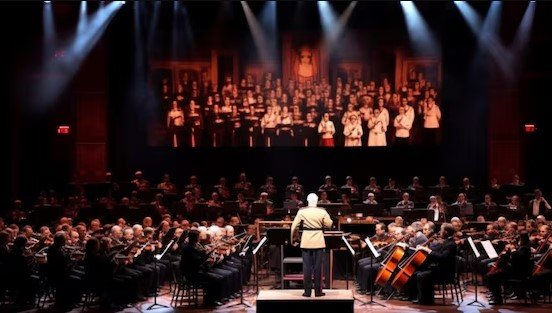The Jerusalem Symphony Orchestra’s Holocaust Memorial Day concert was an evening marked not by direct references to the music of the Holocaust, but rather by its solemn tone and deep connection to Jewish-Israeli heritage. This concert, conducted by Benjamin Yusupov, delved into themes of memory, identity, and the weight of history, focusing on the emotional power of music to convey the seriousness of the occasion.
Held on April 27, 2025, the concert featured the haunting strains of works that evoke reflection and commemoration, with guest performances by cellist Kristina Reiko Cooper and soprano Maria Solozobova-Neuenschwander. Though the repertoire did not include pieces directly composed during the Holocaust, the performance was clearly curated to honor the day with solemn reverence and a focus on the experiences of survivors and their descendants.
A Thoughtful Selection of Works
The concert opened with an emotionally charged piece that set the tone for the evening: a moving orchestral work by a Jewish composer whose music often reflects themes of exile, loss, and survival. The orchestra’s interpretation under Yusupov’s direction immediately immersed the audience in the gravity of the occasion. The music was not simply an artistic expression but a reflection of the collective memory and shared history of the Jewish people.
Cooper’s performance on the cello was particularly striking. Her rendition of the piece demonstrated both technical mastery and a profound emotional depth. The rich, dark timbre of the cello seemed to evoke the somberness of the past, yet it also carried a glimmer of resilience and hope, characteristic of Jewish musical traditions throughout history. Her playing resonated with the silent remembrance of those who perished, while simultaneously honoring the enduring strength of those who survived.

Maria Solozobova-Neuenschwander’s Voice of Reflection
Solozobova-Neuenschwander’s soprano voice provided another layer of poignancy to the performance. Her vocal delivery was delicate yet powerful, encapsulating the vulnerability and determination of the human spirit. In a program that did not directly reference Holocaust-era music, her haunting arias stood as a tribute to the lives lost and the memories preserved through song.
The soprano’s performance was a meditation on both the personal and collective experiences of loss and resilience. Her interpretations carried the audience through a journey of grief, survival, and remembrance. Each note seemed to honor the millions who perished and those who continue to live with the scars of such unimaginable pain.
The Emotional Landscape of Memory
The concert’s deeper connection to Holocaust remembrance emerged not through the inclusion of specific pieces from that era but through the collective mood evoked by the orchestra. Music, in its ability to convey complex emotions, served as a bridge between past and present. The night wasn’t about recounting the history of the Holocaust directly; rather, it was about understanding the lasting impact of such a tragedy and ensuring that the collective memory of it remains alive in every note played and sung.
While many Holocaust Memorial Day concerts focus on works directly tied to the period, the Jerusalem Symphony Orchestra’s choice to present pieces that related thematically rather than historically gave the evening a unique texture. The performance became a space not only to reflect on the horrors of the past but to embrace the shared responsibility of remembering and passing on these stories to future generations.
A Concert for the Ages
Though this concert did not showcase music written in or directly about the Holocaust, the impact of its message was undiminished. The evening was a reminder that Holocaust remembrance is not only about the specifics of the past but about ensuring that its memory endures in every facet of cultural expression, including music. The Jerusalem Symphony Orchestra’s performance reminded us that even in the absence of specific compositions from the Holocaust era, the seriousness of the content and the Jewish-Israeli focus made the evening one of reflection, remembrance, and, perhaps most importantly, resilience.
This concert was a tribute to those lost, to those who survived, and to the power of music as a timeless vehicle for collective memory. As the final notes faded into silence, the audience was left with a deep sense of the solemnity and significance of the day, a powerful reminder that the memory of the Holocaust remains an integral part of the Jewish-Israeli consciousness, one that is carried forward by the arts and music.
